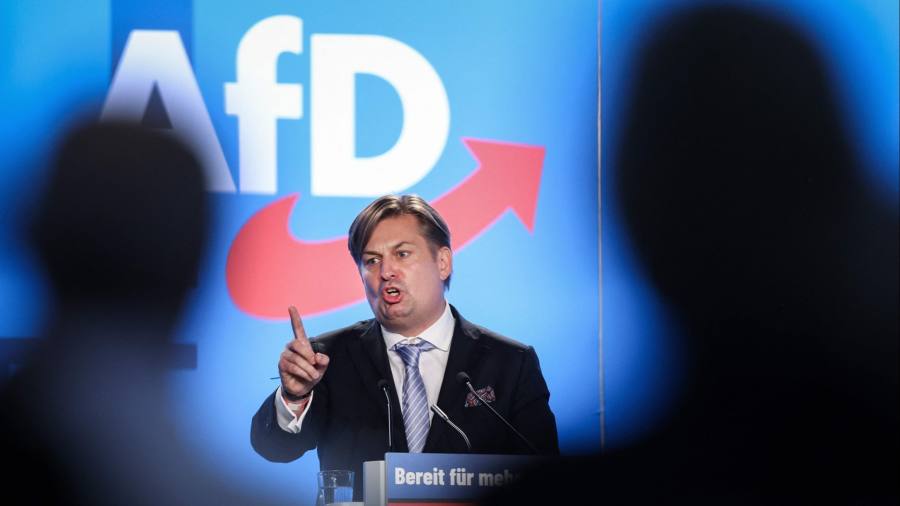
Receive free Alternative für Deutschland updates
We’ll send you a myFT Daily Digest email rounding up the latest Alternative für Deutschland news every morning.
The writer directs the Center on the US and Europe at the Brookings Institution
“We are now the most exciting rightwing party in all of Europe.” Meet Maximilian Krah, leading pick of the Alternative for Germany for the June 2024 European parliament elections. He and other candidates were selected at the weekend at a party conference in Magdeburg, in the eastern German state of Saxony-Anhalt. “Exciting” is one way of putting it.
Krah is a close ally of Björn Höcke, the AfD’s leader in Thuringia, another eastern state. Höcke is under observation by Germany’s domestic intelligence service for his extremist views. The 46-year-old Krah has cultivated ties to Russian-backed oligarchs and travelled to China at the invitation of Huawei, the telecoms company shunned by many western countries as a security risk.
Krah calls the EU a “vassal” of the US and wants to replace it with a “confederacy of fatherlands”. In other words, he wants to use EU funds and the public forum provided by the European parliament to destroy the EU.
Petr Bystron, who is in second place on the AfD’s election list, decries “forced allocation of migrants” and “globalists” who want to impose “compulsory vaccination” on citizens — combining a lie, an antisemitic trope and a conspiracy theory. Bystron is the child of Czech refugees who fled communism in the 1980s. Now he praises Russia as a friendly state and chides the US for “cancel culture”.
As for Höcke, he told a national broadcaster: “This EU must die, so the true Europe may live.” This was a calculated echo of a Nazi-era saying that German soldiers had died in Stalingrad “so Germany may live”.
Only 10 years after its founding by a handful of Eurosceptics, the AfD has surged in national polls to around 20 per cent in recent months, nearly doubling its result in the September 2021 Bundestag elections. That puts it in second place after the Christian Democrats, the main opposition party, but ahead of Chancellor Olaf Scholz’s Social Democrats. Yet it runs first in four out of Germany’s five eastern states (three of which will hold elections next year), with a staggering 30 per cent or more. In June and July, it managed to get a district council leader and a mayor elected for the first time. The intoxicating scent of power has disciplined a party once famous for its internal knife-fights.
This is a party that denies climate change, wants to turn Europe into a “fortress” against refugees and migrants, courts authoritarian powers obsequiously and reviles “the system” — by which it means Germany’s representative democracy. A June study published by the German Institute for Human Rights calls Höcke the driving force in the AfD, with a political vision “based on the violent tyranny of national socialism”.
Populists, authoritarians and ethnonationalists have liberal constitutionalism in their sights in Europe, in the US and in Israel. But while most hard-right parties in Europe are toning down their rhetoric to make themselves more palatable, the AfD is unique in ramping up its radicalisation.
How, you ask, could this be possible in Germany, a country that prides itself — sometimes more smugly than is palatable even to its friends — on its reckoning with its horrific 20th-century past?
Part of the answer is that the mainstream parties have made it disgracefully easy. Four weeks ago, on the last day of the parliamentary term, the Bundestag was to vote on a heating bill, one of the ruling three-party coalition’s key pieces of legislation. The AfD called for an in-person vote, and then walked out. It turned out that, even had the AfD remained, there would have been no quorum.
Scholz’s coalition has tackled monumental challenges: Covid, the war in Ukraine, refugees, energy shocks, the climate crisis. But it has undermined its standing with a cronyism scandal and acrimonious bickering. Meanwhile, CDU leader Friedrich Merz unleashed what Germans like to term ein Shitstorm in his own party when he suggested in an interview that his party might co-operate with the AfD at local level. His credibility as a future chancellor now hangs by a thread.
The rise of the radical right is often blamed on economic disenfranchisement, fears of status loss or the weaponisation of identity issues. Its most hardened bases appear lost to liberal democracy. But it can be pushed back when governments do what they are elected to do: govern. That would be a good start for Scholz and his coalition after the summer recess. For his part, Merz has one job above all others: to maintain the firewall between his party and the AfD. The chancellor and Merz owe it to themselves, to Germany and to Europe to do what is right.